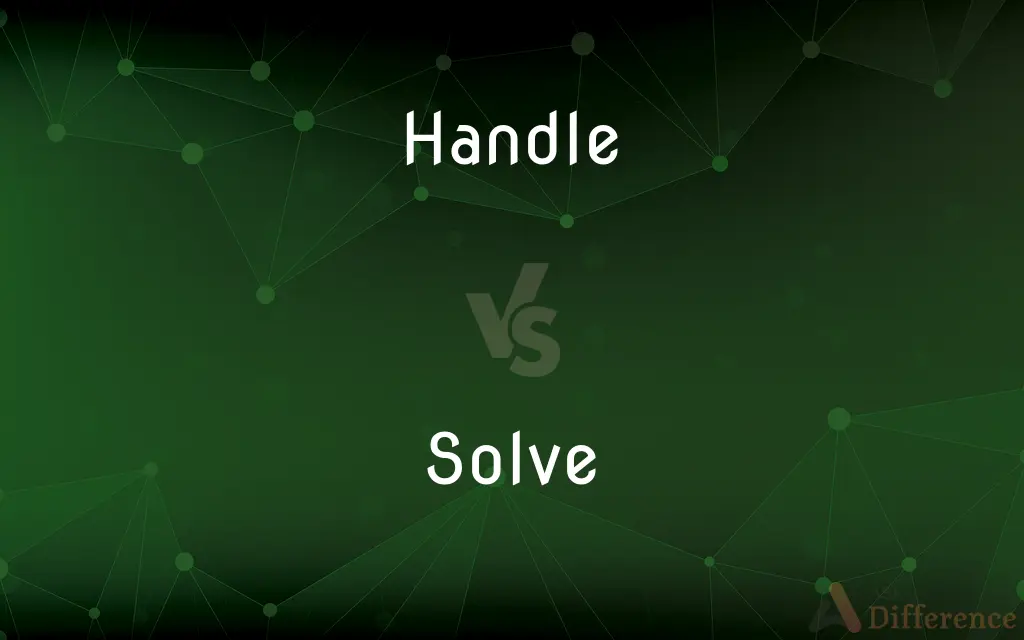Handle vs. Solve — What's the Difference?
By Fiza Rafique & Urooj Arif — Updated on April 22, 2024
"Handle" refers to managing or dealing with a situation or problem, often emphasizing control and process, while "solve" implies finding a solution or resolution, focusing on eliminating the issue entirely.

Difference Between Handle and Solve
Table of Contents
ADVERTISEMENT
Key Differences
Handling a situation involves managing or coping with it, often without necessarily resolving the underlying problem. Whereas solving a situation means finding an effective solution that addresses the root cause and resolves the issue completely.
When you handle a problem, you may employ interim measures or strategies to keep the situation under control or minimize disruption. On the other hand, when you solve a problem, you apply a solution that ideally eliminates the problem or prevents it from recurring.
Handling can be seen as a more ongoing, sometimes temporary approach, suitable for complex issues that require time to fully resolve. Conversely, solving is often a definitive action that aims to put an end to the problem as quickly and efficiently as possible.
In practical terms, handling may involve steps like planning, organizing, and monitoring, which manage the problem but do not necessarily fix it. In contrast, solving usually involves analyzing the problem, devising a solution, and implementing it to achieve a permanent fix.
The choice between handling and solving can depend on the nature of the problem, available resources, and desired outcomes. Handling might be preferred in dynamic situations where ongoing adjustments are needed, while solving is targeted in scenarios where a definitive resolution is possible and desirable.
ADVERTISEMENT
Comparison Chart
Focus
Managing or controlling a situation
Finding a definitive resolution
Outcome
Often temporary or ongoing management
Permanent solution
Approach
Strategic management and coping mechanisms
Analysis and application of solutions
Suitability
Complex, ongoing issues
Problems with clear, achievable solutions
Perception
More about control and process
Focused on results and finality
Compare with Definitions
Handle
To manage or deal with a situation or problem.
She handled the sudden influx of work smoothly.
Solve
To work out a solution or correct answer through reasoning.
They solved the complex equation in minutes.
Handle
To process or deal with something administratively.
The office handles all inquiries during business hours.
Solve
To clarify or explain something thoroughly.
The lecture solved many students' doubts about the subject.
Handle
To control or operate something using the hands.
Can you handle the machinery without supervision?
Solve
To determine or deduce the answer to a problem.
She solved the mystery of the missing files by reviewing the security footage.
Handle
To cope with or manage interpersonal interactions.
He handles difficult customers with ease.
Solve
To find a solution to a problem or puzzle.
The detective solved the case after discovering new evidence.
Handle
To take care of or manage a particular situation or task.
She handled the logistics of the event.
Solve
To resolve a difficult situation or dispute.
Mediation helped solve the conflict between the two departments.
Handle
A handle is a part of, or attachment to, an object that allows it to be grasped and manipulated by hand. The design of each type of handle involves substantial ergonomic issues, even where these are dealt with intuitively or by following tradition.
Solve
To find an answer to, explanation for, or way of dealing with (a problem, for example).
Handle
To touch, lift, or hold with the hands
You should wash your hands before you handle food.
Solve
To solve an equation
Insert the values of the constants and solve for x.
Handle
To operate with the hands; manipulate
Can handle a jigsaw.
Solve
To find an answer or solution to a problem or question; to work out.
Handle
To deal with or have responsibility for; conduct
Handles matters of corporate law.
Solve
To find out the perpetrator, the motive etc of crime
To solve a murder
To solve a crime
Handle
To cope with or dispose of
Handles problems efficiently.
Solve
(mathematics) To find the values of variables that satisfy a system of equations and/or inequalities.
Handle
To direct, execute, or dispose of
Handle an investment.
Solve
(mathematics) To algebraically manipulate an equation or inequality into a form that isolates a chosen variable on one side, so that the other side consists of an expression that may be used to generate solutions.
Handle
To manage, administer to, or represent
Handle a boxer.
Solve
(transitive) To loosen or separate the parts of.
Handle
To deal or trade in the purchase or sale of
A branch office that handles grain exports.
Solve
A solution; an explanation.
Handle
To act or function in a given way while in operation
A car that handles well in the snow.
Solve
To explain; to resolve; to unfold; to clear up (what is obscure or difficult to be understood); to work out to a result or conclusion; as, to solve a doubt; to solve difficulties; to solve a problem.
True piety would effectually solve such scruples.
God shall solve the dark decrees of fate.
Handle
A part that is designed to be held or operated with the hand
The handle of a suitcase.
The handle of a faucet.
Solve
A solution; an explanation.
Handle
A means of understanding or control
Has a handle on the situation.
Solve
Find the solution to (a problem or question) or understand the meaning of;
Did you solve the problem?
Work out your problems with the boss
This unpleasant situation isn't going to work itself out
Did you get it?
Did you get my meaning?
He could not work the math problem
Handle
(Slang) A person's name.
Solve
Find the solution;
Solve an equation
Solve for x
Handle
An alternate name or nickname, especially one chosen for self-identification on online forums or citizens band radio.
Solve
Settle, as of a debt;
Clear a debt
Solve an old debt
Handle
(Games) The total amount of money bet on an event or over a set period of time.
Handle
The part of an object which is (designed to be) held in the hand when used or moved.
Handle
An instrument for effecting a purpose (either literally or figuratively); a tool, or an opportunity or pretext.
Handle
(gambling) The gross amount of wagering within a given period of time or for a given event at one of more establishments.
The daily handle of a Las Vegas casino is typically millions of dollars.
Handle
(textiles) The tactile qualities of a fabric, e.g., softness, firmness, elasticity, fineness, resilience, and other qualities perceived by touch.
Handle
(slang) A name, nickname or pseudonym.
Handle
(slang) A title attached to one's name, such as Doctor or Colonel.
The successful businessman was knighted and acquired a handle to his name.
Handle
(computing) A reference to an object or structure that can be stored in a variable.
This article describes how to find the module name from the window handle.
Handle
A 10 fluid ounce (285 mL) glass of beer.
Handle
(US) A half-gallon (1.75-liter) bottle of alcohol.
Handle
A point, an extremity of land.
The Handle of the Sug in Newfoundland
Handle
(topology) A topological space homeomorphic to a ball but viewed as a product of two lower-dimensional balls.
Handle
(algebraic geometry) The smooth, irreducible subcurve of a comb which connects to each of the other components in exactly one point.
Handle
(transitive) To touch; to feel or hold with the hand(s).
Handle
To accustom to the hand; to take care of with the hands.
Handle
(transitive) To manage, use, or wield with the hands.
Handle
(transitive) To manage, control, or direct.
Handle
(transitive) To treat, to deal with (in a specified way).
She handled the news with grace
The Persians handled the French ambassador shamefully
Handle
(transitive) To deal with (a subject, argument, topic, or theme) in speaking, in writing, or in art.
Handle
(transitive) To receive and transfer; to have pass through one's hands; hence, to buy and sell.
A merchant handles a variety of goods, or a large stock
Handle
To be concerned with; to be an expert in.
Handle
(transitive) To put up with; to endure (and continue to function).
I can't handle this hot weather.
Handle
(intransitive) To use the hands.
Handle
To illegally touch the ball with the hand or arm; to commit handball.
Handle
(intransitive) To behave in a particular way when handled (managed, controlled, directed).
The car handles well
Handle
To touch; to feel with the hand; to use or hold with the hand.
Handle me, and see; for a spirit hath not flesh.
About his altar, handling holy things.
Handle
To manage in using, as a spade or a musket; to wield; often, to manage skillfully.
That fellow handles his bow like a crowkeeper.
Handle
To accustom to the hand; to work upon, or take care of, with the hands.
The hardness of the winters forces the breeders to house and handle their colts six months every year.
Handle
To receive and transfer; to have pass through one's hands; hence, to buy and sell; as, a merchant handles a variety of goods, or a large stock.
Handle
To deal with; to make a business of.
They that handle the law knew me not.
Handle
To treat; to use, well or ill.
How wert thou handled being prisoner?
Handle
To manage; to control; to practice skill upon.
You shall see how I will handle her.
Handle
To use or manage in writing or speaking; to treat, as a theme, an argument, or an objection.
We will handle what persons are apt to envy others.
Handle
To use the hands.
They have hands, but they handle not.
Handle
That part of vessels, instruments, etc., which is held in the hand when used or moved, as the haft of a sword, the knob of a door, the bail of a kettle, etc.
Handle
That of which use is made; the instrument for effecting a purpose; a tool.
Handle
The appendage to an object that is designed to be held in order to use or move it;
He grabbed the hammer by the handle
It was an old briefcase but it still had a good grip
Handle
Be in charge of, act on, or dispose of;
I can deal with this crew of workers
This blender can't handle nuts
She managed her parents' affairs after they got too old
Handle
Interact in a certain way;
Do right by her
Treat him with caution, please
Handle the press reporters gently
Handle
Deal with verbally or in some form of artistic expression;
This book deals with incest
The course covered all of Western Civilization
The new book treats the history of China
Handle
Touch, lift, or hold with the hands;
Don't handle the merchandise
Handle
Handle effectively;
The burglar wielded an axe
Handle
Show and train;
The prize-winning poodle was handled by Mrs. Priscilla Prescott
Common Curiosities
How do skills required for handling differ from those for solving?
Handling often requires strategic and administrative skills, whereas solving requires analytical and reasoning skills.
What is the difference in focus between handling and solving?
Handling focuses on management and control, while solving is about finding a permanent resolution.
What does it mean to handle a situation?
Handling a situation means managing it through control and strategic measures without necessarily resolving it completely.
Is solving always preferable to handling?
Not necessarily; it depends on the situation's complexity and the desired outcomes.
Can handling be a part of solving a problem?
Yes, effective handling can be a part of the process in solving a problem by maintaining control until a solution is found.
Why might someone choose to handle a problem instead of solving it?
Due to resource limitations, the complexity of the issue, or when a temporary management is more feasible.
Can a situation require both handling and solving?
Yes, some situations may require initial handling before a permanent solution can be implemented.
Does solving a problem always guarantee it won’t recur?
While solving aims to prevent recurrence, it doesn’t guarantee it, especially in complex scenarios.
What makes solving a problem definitive?
Solving is definitive because it aims to address and eliminate the root cause of a problem.
How do approaches to handling and solving differ in a workplace setting?
In a workplace, handling might involve managing workflows and interactions, while solving would focus on resolving issues like system errors or process inefficiencies.
Share Your Discovery

Previous Comparison
Trustable vs. Trusted
Next Comparison
Vassal vs. KnightAuthor Spotlight
Written by
Fiza RafiqueFiza Rafique is a skilled content writer at AskDifference.com, where she meticulously refines and enhances written pieces. Drawing from her vast editorial expertise, Fiza ensures clarity, accuracy, and precision in every article. Passionate about language, she continually seeks to elevate the quality of content for readers worldwide.
Co-written by
Urooj ArifUrooj is a skilled content writer at Ask Difference, known for her exceptional ability to simplify complex topics into engaging and informative content. With a passion for research and a flair for clear, concise writing, she consistently delivers articles that resonate with our diverse audience.
















































